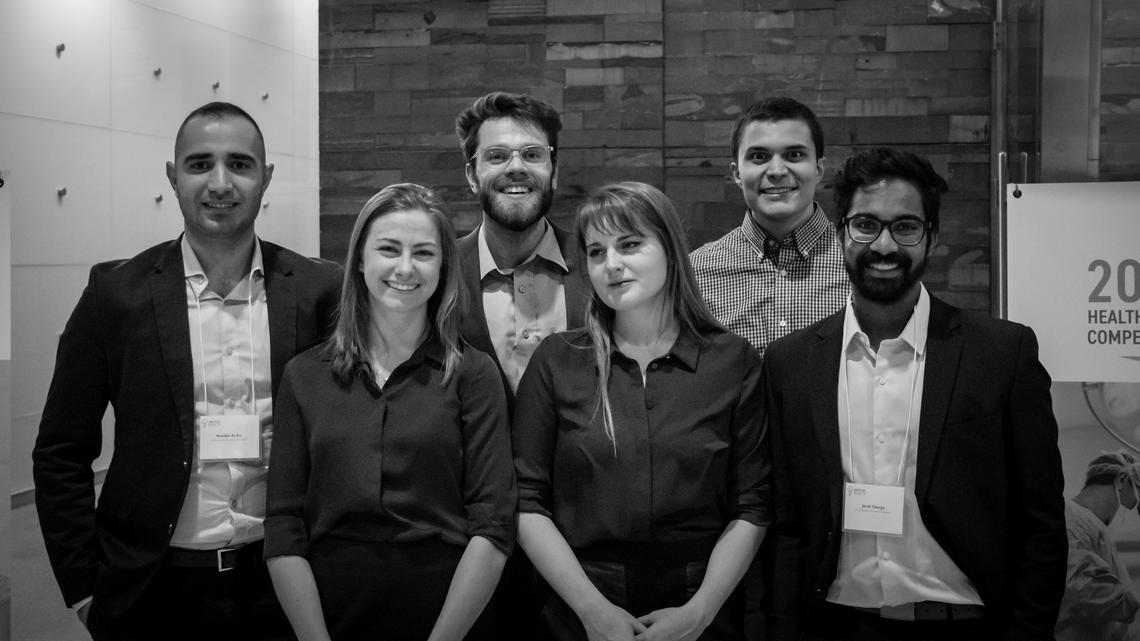Nov. 30, 2017
First-place students win $30,000 in inaugural Innovation 4 Health Hack Competition with automated IV pole design

It was a gruelling 72 hours. More than 100 undergraduate and graduate students worked throughout the weekend to try to solve technical problems facing surgeons operating on humans or animals. The university’s first Innovation 4 Health Hack Competition (I4H) saw 15 multidisciplinary teams of students from the multi-faculty Biomedical Engineering Graduate Program, the Cumming School of Medicine, Haskayne School of Business, Faculty of Veterinary Medicine (UCVM), and Schulich School of Engineering tackle real-world technology challenges submitted by surgeons.
Saba Aslam and her team worked into the wee hours the final night trying to finesse a safer, more modular and automated IV pole. “It was pretty intense,” says Aslam, a UCVM grad and master's student in Biomedical Engineering. “The last night we put it together and the sensor system wasn’t working well. We stayed up until about 2 a.m. doing it over and over again to make sure it worked.”
In the end, the IV pole came in first, winning a $30,000 prize. The design holds a number of tubes, keeps everything from tangling and doesn’t pose a tripping hazard. The team — Aslam, Richard Beddoes, Chelsea Ford-Sahibzada, Luis Souto Maior, Miriam Nightingale, David Tanhelson, Lauren Wong, and Curt Zerr — will use the prize money to further develop and prototype their product. “I haven’t done anything like this before,” says Aslam. “It was pretty exciting.”
It was nail biter for the panel of judges too. They included veterans in innovation, surgery, the biotech industry, entrepreneurship and business development. “The first- and second-place winners were tied on four of five categories,” says Abdullah Al-Ani, I4H co-founder and a Biomedical Engineering PhD candidate. “It was a great competition. The judges were extremely impressed with the calibre of the projects and they had a really hard time figuring out which ones to choose.”
Other winners include Wire Wizards and Christmas tree lock
Second place, and $20,000, went to the team that developed a device to keep wires out of surgeons’ way while performing laparoscopic surgery. The Wiring Wizards team is Quinn Andre, Michelle Cheng, Bryce Geeraert, Cynthia Kahl, Angela Kim, Rooney Lee, and Spencer Montgomery.
The third-place winner took home $10,000 for developing an adaptor, called a Christmas tree lock, that can accommodate different-sized chest tubes in veterinary surgeries. The team is Parthiv Amin, Gary Gress, Janica Echavez, and Sophie Hu.
The People’s Choice award and $5,000 went to the team that developed electrodes that can predict a brain seizure. The team is Brian Cechmanek, Jonah Diminik, Amirali Kazeminejad, John Miko, Negar Mohammadi, Mark Sebestyen, Mark Simpson, and Andrey Sizyajov.

Abdullah Al-Ani, Danielle Whittier, Riley Booth, Kathryn Simone, Andres Kroker and Jacob George.
Competition shines a light on student skills
“This kind of competition really shines a light on the knowledge and skills that our students have to solve real-life problems in veterinary and human medicine,” says Mark Ungrin, PhD, ambassador to The Hunter Hub for Entrepreneurial Thinking for the Faculty of Veterinary Medicine. “This competition was an invaluable opportunity for students to collaborate with each other, dream big and see that their brain power and ideas have the potential for impact in the wider world.”
I4H was started by five Biomedical Engineering graduate students who wanted to solve daily clinical challenges. Danielle Whittier came up with the idea and it was realized by Abdullah Al-Ani, Kathryn Simone, Jacob George, Andres Kroker, and Riley Booth, along with 30 students who volunteered their time. I4H is supported by The Hunter Hub for Entrepreneurial Thinking, Cumming School of Medicine, Biomedical Engineering Graduate Program, Graduate Students' Association, Faculty of Veterinary Medicine, Innovate Calgary and Schulich School of Engineering.
Mark Ungrin, PhD, is an associate professor in the Department of Comparative Biology and Experimental Medicine in the Faculty of Veterinary Medicine and a member of Alberta Children’s Hospital Research Institute, and the McCaig Institute of Bone and Joint Health at the Cumming School of Medicine. He is also a member of the Centre for Bioengineering Research and Education and works closely with the Biomedical Engineering Graduate Program.
The University of Calgary’s multidisciplinary Engineering Solutions for Health: Biomedical Engineering research strategy drives solutions to our most pressing health challenges in disease and injury prevention, diagnosis and treatments. Our biomedical engineering researchers make a significant impact in our communities by extending lives, improving quality of life, promoting independence, and continuously improving the health system
